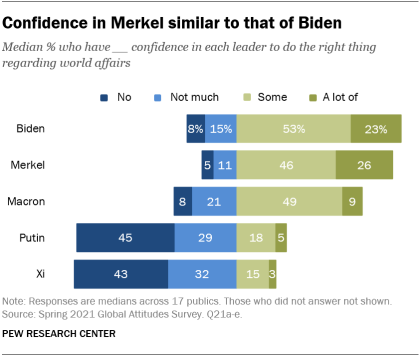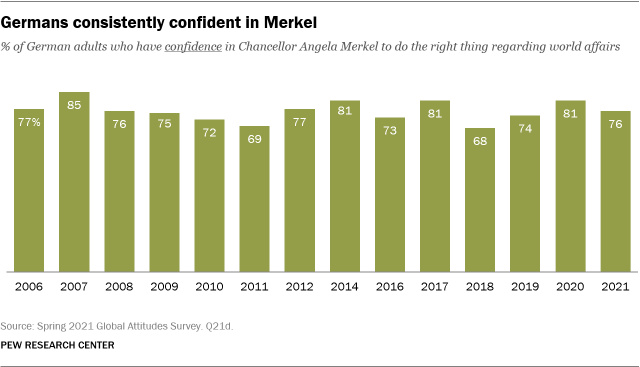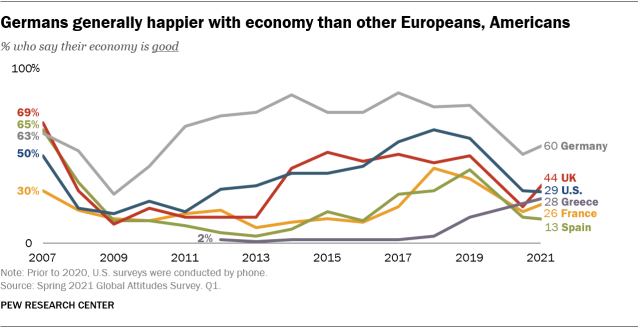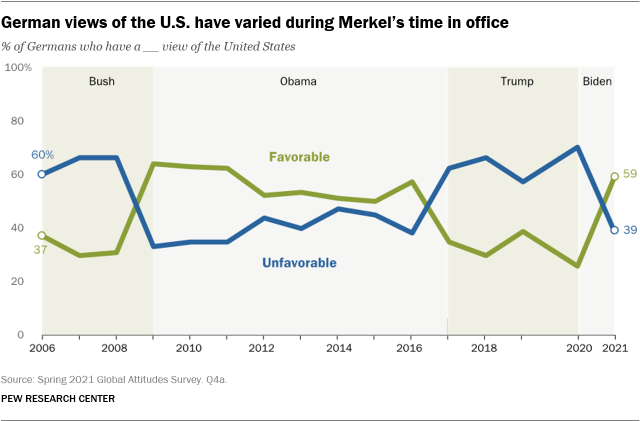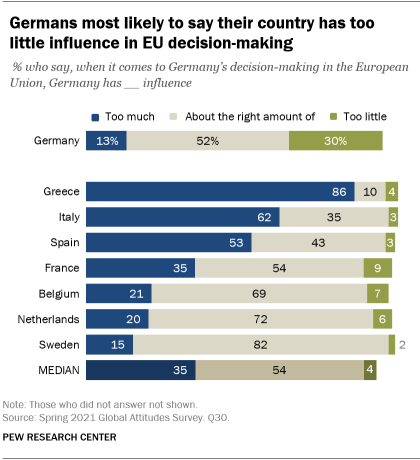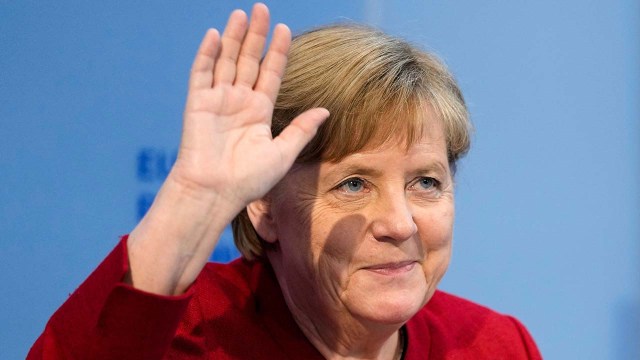
As Angela Merkel prepares to step down after a 16-year run as chancellor following this year’s German national election on Sept. 26, confidence in the leader to do the right thing in world affairs has been and remains high across many publics surveyed by Pew Research Center over the years. Over the course of Merkel’s tenure, Germans have generally had more favorable views of their national economy than other Europeans and Americans had of their own. Throughout Merkel’s leadership, Germans’ views of the United States have changed widely over time, largely dependent upon who the president was, while views of German leadership in the European Union have remained widely consistent among both Germans and people in other EU member states.
This Pew Research Center analysis focuses on German and international attitudes during German Chancellor Angela Merkel’s time in office. For non-U.S. data, this post draws on nationally representative surveys of 16,254 adults from March 12 to May 26, 2021, in 16 advanced economies. All surveys were conducted over the phone with adults in Canada, Belgium, France, Germany, Greece, Italy, the Netherlands, Spain, Sweden, the United Kingdom, Australia, Japan, New Zealand, Singapore, South Korea and Taiwan.
In the United States, we surveyed 2,596 U.S. adults from Feb. 1 to 7, 2021. Everyone who took part in the U.S. survey is a member of the Center’s American Trends Panel (ATP), an online survey panel that is recruited through national, random sampling of residential addresses. This way nearly all adults have a chance of selection. The survey is weighted to be representative of the U.S. adult population by gender, race, ethnicity, partisan affiliation, education and other categories.
This study was conducted in places where nationally representative telephone surveys are feasible. Due to the coronavirus outbreak, face-to-face interviewing is not currently possible in many parts of the world.
Here are the questions used for this analysis, along with responses. Visit our methodology database for more information about the survey methods outside the U.S. For respondents in the U.S., read more about the ATP’s methodology.
Many have had more confidence in Merkel than in other world leaders.
Over the course of her tenure, Merkel has enjoyed more confidence from global publics than have most other leaders, including Emmanuel Macron and Nicolas Sarkozy of France, Vladimir Putin and Dmitri Medvedev of Russia, Boris Johnson of the United Kingdom, Xi Jinping of China and Donald Trump of the U.S.
Confidence in Merkel increased over time in many places, and fewer people have been likely to give a “don’t know” response when asked whether they have confidence in her or not. While consistently popular, median confidence in Merkel across the global publics surveyed by Pew Research Center never surpassed that of former U.S. President Barack Obama. However, across the 17 publics surveyed in 2021, median confidence in Merkel is similar to that of current President Joe Biden.
Merkel has enjoyed high ratings among Germans, but other publics have ranked her even higher.
Angela Merkel has enjoyed high confidence among the German people since she entered the chancellery. Two-thirds or more have had confidence in the leader over time, ranging from a high of 85% after her first full year in office in 2007 to a low of 68% in 2018. Now in 2021, German confidence in Merkel (76%) is about at the median of 16 other publics surveyed (77%). In most European countries, seven-in-ten or more have confidence in the leader, while nine-in-ten do in the Netherlands and Sweden. Only in Greece do fewer than about two-thirds of people have confidence in Merkel to do the right thing in world affairs.
Germans have been among the happiest with their economy over time, but views have fluctuated under Merkel.
Germans have generally been among the happiest with their economy compared with other publics surveyed repeatedly since 2007, but this has fluctuated during Merkel’s tenure. Views were less optimistic in 2009, during the Great Recession, when only 28% of Germans said the economy was good; by comparison, a high of 86% said the same in 2017. While there have been some ebbs and flows largely in line with the state of the global economy, Germans have had generally better views of their economy than have Britons, Americans, French, Spaniards or Greeks.
However, when compared with other Northern European countries surveyed in more recent years, people in the Netherlands and Sweden have been slightly more positive than Germans when it comes to their own economies.
Germans’ views of the U.S. have swung widely under Merkel.
Germans’ views of the U.S. have varied widely since Merkel took office and are largely related to who the U.S. president has been. In 2006, during George W. Bush’s time as president and the ongoing Iraq War, only 37% of Germans had a favorable opinion of the U.S. Views of the U.S. hit a low in 2007, when only three-in-ten Germans viewed the U.S. positively. Ratings rose to a high of 64% in 2009 once Obama assumed the presidency, and they remained at 50% or higher until Trump became president in 2017. Ratings hit their lowest in 2020 amid the COVID-19 pandemic, when only 26% of Germans had a favorable view of the U.S. Views have improved considerably in 2021 under the Biden presidency, as nearly six-in-ten Germans (59%) have a positive view of the U.S.
Germans’ views on the transatlantic relationship between the two nations have also fluctuated over time. During Trump’s last year in office, only 18% of Germans said relations were good with the U.S., and many said that the U.S. was not a partner on key issues like protecting the environment and dealing with China, among others. However, when polled following the election of Biden to the presidency, the share of Germans who viewed the U.S. as the most important policy partner for Germany rose by 13 percentage points, from 10% to 23%. France retained the top position as the most important foreign policy partner among Germans.
Most Europeans have said Germany has about the right amount of influence in the EU.
With the exception of Greeks, most Europeans say Germany has about the right amount of decision-making power in the EU. Views of Germany’s role in the EU have been largely consistent over time among those in France, Sweden and the Netherlands, while those in Italy and Spain have grown more comfortable with Germany’s decision-making power in the bloc since the question was last asked in 2017.
Among Europeans, Germans are the least likely to say Germany has too much influence in the EU. Only about one-in-ten (13%) say that the country has too much influence, while 52% say it has about the right amount and three-in-ten say it has too little influence.
Note: Here are the questions used for this analysis, along with responses. Visit our methodology database for more information about the survey methods outside the U.S. For respondents in the U.S., read more about the ATP’s methodology.


